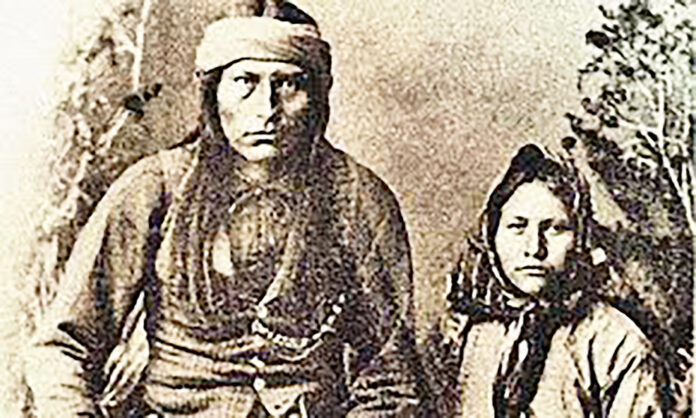Indigenous Peoples’ Day, otherwise known as Columbus Day, took place on October 9 this year. According to Kyle Mays, a professor from the department of American Indian Studies at the University of California, who spoke with PBS, the day is “acknowledging the history of dispossession and violence against Indigenous people.”
Mays is referring to the unforgettable history of the original American people who, long ago, before colonialism reached the shores of their vast lands, were the majority and lived upon the land freely.
But there is a group within the indigenous peoples that is rarely recognized, the Indigenous American Muslims. What proof of them exists in history? The best way to answer this question is by searching for the clues history has left behind.
According to research by Sam Haselby, a historian and junior fellow at the Harvard Society of Fellows, an Islamic presence was already in the Americas amongst the indigenous people before Columbus reached its shores and had been there long enough for its native peoples to have mastered the Arabic language.
Haselby notes: “The first words to pass between Europeans and Americans…. were in the sacred language of Islam. …When Columbus’s interpreter, a Spanish Jew, spoke to the Taíno of Hispaniola, he did so in Arabic.”
So how did the indigenous Americans become familiar with Arabic? What situations existed to bring about the use of the language of Muslims among the native population? This phenomenon seems to have started in Spain.
According to Haselby, by 1492, the Spanish Inquisition “had coerced between 300,000 and 800,000 Muslims… to convert to Christianity. Spanish Catholics often suspected these Morisco… of practicing Islam in secret, and the Inquisition pursued and persecuted them. Some, almost certainly, sailed in Columbus’s crew, carrying Islam in their hearts and minds.”
With this piece of history we can ascertain the need of a displaced people to find a place of safety amongst friendly folk not interested in inhibiting religious practice or subduing freedoms.
Fears amongst the Spanish of the effects of their persecution on the ousted adversaries became a reality in the new lands. Research published at San Francisco State University by Virginia Monica Bachinelo San Francisco gives this perspective: “Spanish suspicions of the spread of Islam to the indigenous community were correct: some indigenous people did convert to Islam and practiced in secret. Alongside them, Moriscos [Spanish Muslim survivors of the inquisition] practiced Islam in secret and taught their children how to read and write in Arabic.”
Other key points of evidence were found in the exploration of islands close to the early Americas that spoke of the history of the people who resided there.
In the Seattle Journal for Social Justice, researcher Nadia B. Ahmad of Pace Law School, notes:
“…historical reports not only suggest contact between Muslim seamen and indigenous peoples in the Americas, but also describe travel between islands… showing the inter-American exchange of Islamic culture and Arabic language. The islanders had acquired the ability to speak Arabic, a language that cannot be mastered through a single contact, suggesting that Arabic-speaking Muslim merchants or adventurers must have regularly visited the locals or the locals had lived in Muslim territory”.
Although not stated by Ahmad, one could also imagine this interaction to have resulted in a new mixed community where people lived together and adopted each other’s culture and language.
Ahmad also reiterates the presence of Muslims from Spain and West Africa in the Americas “at least five centuries before Columbus” stating the level of education and vast experience in navigation would facilitate such. “Indeed, early explorers used maps that were derived from the work of Muslim scholars who possessed advanced geographical and navigational techniques,” she writes.
“On October 12, 1492,” Ahmad notes, “Colón [Columbus] landed on the small island of Guanahani in the Bahamas. The island was called Guanahani by the natives, but was renamed by San Salvador. Guanahani is derived from Mandinka and modified Arabic words where Guana (Ikhwana) means ‘brothers’ and Hani is an Arabic name (‘Hani brothers’)”.
Evidence collected through historical events indicate Muslims of Arab and African descent found shelter with the native peoples of America before the slave trade was widely practiced on American shores. This comradery fostered new communities of indigenous Americans and Muslims, bringing into existence the indigenous American Muslim, with no coercion or force.
Why isn’t there common knowledge of this today?
Currently, Indigenous Peoples Day is celebrated alongside Columbus Day. “Columbus was a lost explorer who stumbled into this part of the world and brought famine, colonization, the deaths of millions of Indigenous peoples,” said Nick Tilsen, president and CEO of the NDN Collective, an Indigenous-led advocacy group. “For this country to celebrate that history is absolutely disrespectful.”
IP Correspondent






